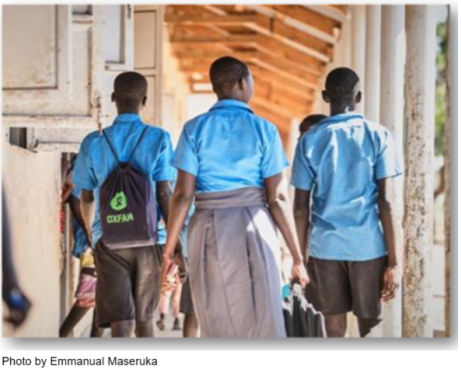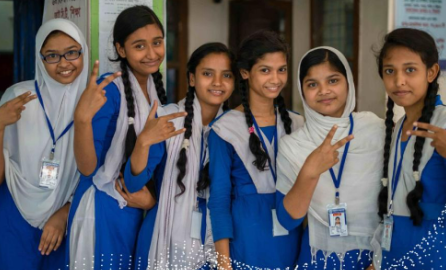Children’s Clubs and networks in Education in Emergencies in Sub-Saharan countries

-
Gender marker: G2-Promotes gender equality as a primary objective
-
Period of implementation: 2018 - 2022
-
Amount: EUR 19,200,000
-
Geographical area: Sub-Saharan Africa
-
Implementing partners:
-
Norwegian Refugee Council (NRC) and partners in DRC and Tanzania
-
Oxfam and partners in Northern Uganda and South Sudan
-
Plan International and partners in Ethiopia
-
Somalia Save the Children and partners in DRC and Niger
-
-
GAP III’s Areas:
-
Gender-Based Violence
-
Sexual and reproductive health and rights
-
Economic and social empowerment
-
Girls and boys face significant challenges in emergency settings, such as protracted conflict situations where large number of people are displaced but also in host communities. In countries such as the Democratic Republic of Congo, Ethiopia, Somalia, Niger, Tanzania, Uganda and South Sudan, wars and population movements have left their mark on the environment and the population. Where men largely outnumber women teachers and school leaders, girls are left without female role models or support.
Unfortunately, this endemic gender inequality is exacerbated by emergencies and conflicts. When populations are displaced, intersectional gender inequalities, especially language and ethnicity, make things even worse in host government education systems. Lack of income within the displaced community increases girls’ vulnerability to child marriage or sexual exploitation. Security issues intensify the risks faced by unaccompanied boys and girls, such as recruitment by armed groups and gender-based violence. Bombed or occupied schools create barriers to menstrual hygiene management (MHM). Finally, COVID-19 school closures have severely reduced recent gains in female enrolment in basic education.
The EU-funded Building Resilience in Crisis through Education (BRiCE) project has supported the provision of safe, quality education and strengthened the resilience of basic education systems for more than 200,000 displaced and host community children in the seven countries mentioned above, where protracted conflict has put the education of girls and vulnerable boys at risk. In particular, to ensure more girls were in school, this programme included children’s clubs to protect and empower vulnerable girls and boys and to promote gender equality and children's rights in these emergency education settings.
-
The clubs and networks were able to promote gender equality and children´s rights, with significant results including:
-
Adolescent girls’ re-admission to, and completion of, basic education after child marriage;
-
Child protection, positive discipline, and referral systems that reduced school-related gender-based violence;
-
Menstrual health management and awareness of sexual and reproductive health and rights;
-
Vulnerable (and often traumatised) girls and boys were empowered through the participatory methodology and structured life-skills content of club activities.
Together with the European Commission - Directorate General for International Partnerships, the Norwegian Refugee Council (NRC) and other partners worked with 350 children’s clubs to build these practices. While these clubs covered only 4-6% of the total number of children supported by BRiCE in basic education, club activities were cascaded to whole schools and integrated into school and community child protection services.
BRiCE demonstrates how general education interventions can be integrated with gender-targeted ones. This appeared to result in changed the attitudes of both students and teachers in the seven BRiCE countries. Furthermore, they did so in ways that foster ownership by governments and local stakeholders using cost-effective approaches – supporting the programme’s lasting potential both in direct impact and as an example of repeatable success.
“In August 2020, I was invited to attend a training on adolescent sexual reproductive health rights. Back home in my community I began conducting home visits. During my visits in the community, I found a 16-year-old AEP learner who was made pregnant by a cousin and was undergoing emotional abuse by her parents. Her dad had forced her to leave home and join the man for marriage. This did not go well with the boy’s parents. The girl was brought back to her parents, and she contemplated abortion and suicide. The knowledge I acquired from the training helped me to reconcile the girl with her parents. As I speak, she is back to school with her pregnancy happily living with her parents. The project is providing her with psychosocial support and non-food items. My new approach to work resulting from the training remains significant in the way I perform my duties as a senior woman teacher. It has helped me exploit my potential and reach out to a wider audience beyond the school confines. I have the joy to see the 16-year-old girl and other girls in similar conditions back to school. To all senior women teachers out there: Meet the young girls outside school premises. Many girls and young women need our support.” Female AEP teacher, Awich Primary School, Palabek Refugee Settlement
